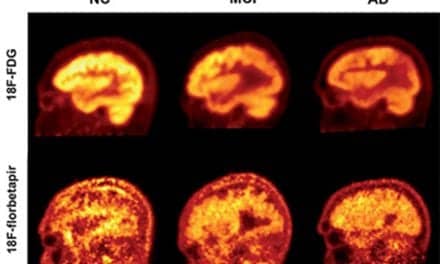 The American College of Radiology, Alzheimer’s Association, and American College of Radiology Imaging Network are gearing up to conduct a major research study to assess the impact of brain amyloid PET imaging on a variety of patient outcomes.
The American College of Radiology, Alzheimer’s Association, and American College of Radiology Imaging Network are gearing up to conduct a major research study to assess the impact of brain amyloid PET imaging on a variety of patient outcomes.
With an estimated budget of $100 million, the Imaging Dementia – Evidence for Amyloid Scanning (IDEAS) study is a four-year trial that will determine the clinical usefulness and value in diagnosing Alzheimer’s and other dementias in certain situations of a brain PET scan.
The study protocol received approval with requirements by the Centers for Medicare and Medicaid Services (CMS). Participating providers will be reimbursed for the PET scans under the CMS Coverage with Evidence Development policy, which requires research study participation as a condition of Medicare payment.
IDEAS is led by the Alzheimer’s Association and managed by the ACR and American College of Radiology Imaging Network (ACRIN).
“The purpose of the IDEAS study is to examine how brain imaging, specifically an amyloid PET scan, helps guide doctors in diagnosing and treating Alzheimer’s and other dementias in cases where the cause of cognitive impairment is difficult to diagnose,” said Gil D. Rabinovici, MD, IDEAS study chair and associate professor of neurology at the University of California, San Francisco. “We believe the study will show that, in diagnostically uncertain cases, knowledge of amyloid status will lead to significant changes in patient management — such as earlier counseling and prescription of more appropriate drugs — that will translate into improved long-term outcomes.”
The IDEAS study was created in response to an unsupportive 2013 CMS national coverage decision (NCD). Deeming that there is not enough evidence to conclude that amyloid PET imaging is necessary for the diagnosis or treatment of patients with dementia or neurodegenerative disease, CMS questioned whether the scan could really lead to better health outcomes, including avoidance of futile treatment or tests, improving or slowing the decline of quality of life, and survival.
Nevertheless, according to CMS, PET amyloid imaging is promising to exclude Alzheimer’s in narrowly defined and clinically difficult diagnoses and to enrich clinical trials seeking better treatments or prevention strategies for Alzheimer’s. Under the NCD, Medicare will provide coverage for one amyloid PET scan per patient enrolled in an approved clinical study.
“I am confident that, at the end of this study, we will have amassed sufficient data to assess whether amyloid imaging has a positive impact on patient outcomes leading to expansion of beneficiary access to this important procedure beyond the IDEAS study,” said Maria Carrillo, PhD, a co-chair of the IDEAS study and chief science officer at the Alzheimer’s Association.
As part of the study, more than 18,000 Medicare beneficiaries age 65 and older will be enrolled over 24 months at roughly 200 sites throughout the United States.
Get AXIS e-newsletters free. Subscribe here.





